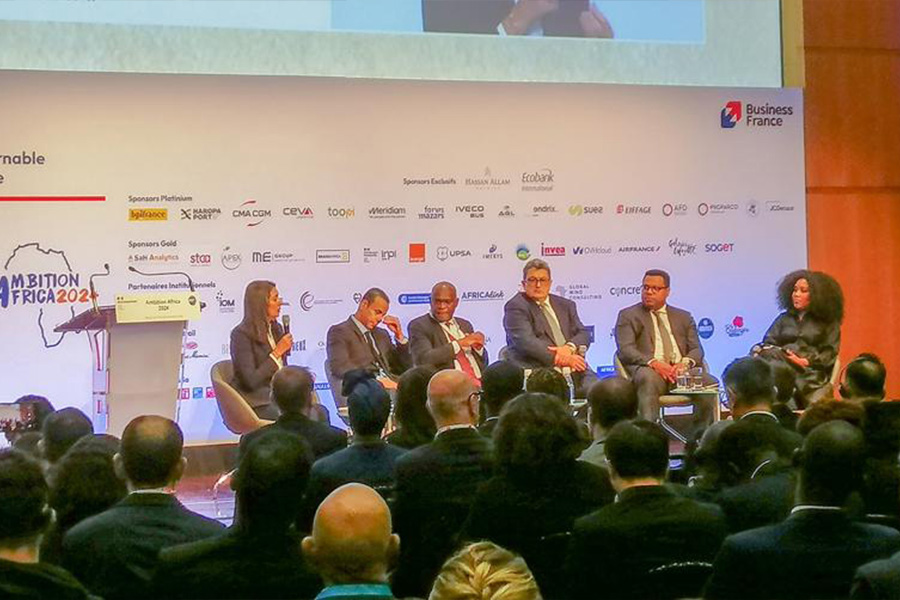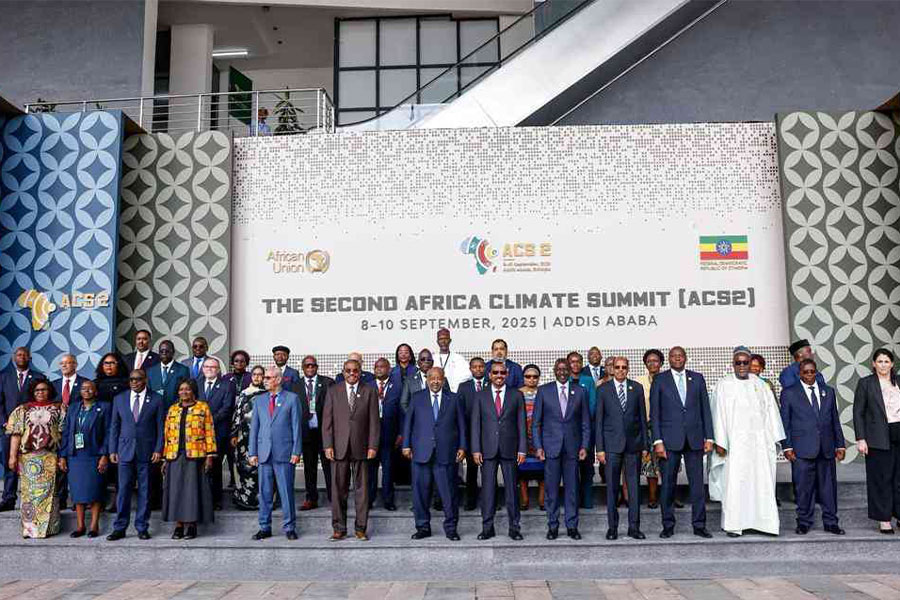
Life Matters | Jun 07,2025
Oct 2 , 2021
By Fitsum Assefa (PhD) , Fekadu Beyene (Prof.)
By aligning Ethiopia’s 2030 climate target with national development planning, the country is demonstrating that it is possible to support inclusive economic development while protecting the environment, write Fitsum Assefa (PhD) and Fekadu Beyene (Prof.), heads of the Planning & Development Commission and the Environment, Forest & Climate Change Commission, respectively.
In 2021, we reach a critical inflection point for the wellbeing of people and the planet. As we rebuild communities and economies from the impacts of the COVID-19 pandemic, we must place people and livelihoods of the most vulnerable at the centre of the recovery.
We are now approaching COP26, the landmark UN Climate Conference, where countries are slated to enhance climate commitments (NDCs) under the Paris Agreement. This is an opportunity to simultaneously address both the climate crisis and people-centered development. In doing as such, we can emerge stronger, more resilient and more prosperous.
Ethiopia is already taking important steps to achieve its development and climate change objectives. Ethiopia’s Environment, Forest &Climate Change Commission recently reaffirmed our commitment to reduce emissions by updating and enhancing our NDC with due emphasis on both mitigation and adaptation.This shows that the Ethiopian government is committed to reducing emissions by 68.8pc in 2030 compared with a ‘business as usual’ pathway.
This 2030 target is fully aligned with Ethiopia’s new 10-year development plan, an all-of-government effort led by the Planning &Development Commission (PDC) and approved by Parliament in March. Our 10-year development plan envisions our country as an African beacon of prosperity.
Mounting evidence shows that low-carbon growth, policies and investments will create more employment, higher productivity, better quality demand and growth, and higher added value across the economy. Globally, according to the New Climate Economy, a conservative estimate puts the cumulative economic benefits of low-carbon growth through 2030 at 26 trillion dollars compared with business-as-usual pathways. Investing in resilience pays off too; evidence shows that a 1.8 trillion dollar investment in five key areas for climate change adaptation and building climate resilience could generate 7.1 trillion dollars in net benefits globally between 2020 and 2030.
In Ethiopia, modeling shows that poverty levels will reach 7.55pc by 2030 if we continue on with business-as-usual, but will decrease to nearly seven percent if we follow the conditional NDC pathway, which pursues the 68.8pc emission reduction goal. Increased climate action will ensure a just and sustainable development pathway in Ethiopia, where income of the poorest rural households increases and the gap between the richest and the poorest begins to close. Environmentally sound, socially just and economically efficient, low-carbon development thus becomes a key part of Ethiopia’s pathway for development.
This is important as Ethiopia’s development aspirations face a number of interconnected crises: a COVID-19-driven economic slowdown, persistent and high poverty, food insecurity, and climate change. As of September 13, 2021, Ethiopia is at 54pc of its past level of peak cases of COVID-19 and falling, and only about 2.4pc of the population has been vaccinated.
The COVID-19 pandemic and the economic crisis has hit the poorest and most vulnerable people the hardest, and Ethiopians are feeling these impacts. More than half of households recently surveyed reported that their incomes were either reduced or had totally disappeared in April 2020, with women-headed households being hit hardest. Some areas are reporting record-high health centre and hospital admissions for severe acute malnutrition, at rates 50pc higher than for the same period the year before COVID-19 hit.
At the same time, Ethiopia continues to face disproportionate climate-related threats, exacerbating COVID-19 impacts, poverty and food insecurity. Heavy rainfall in late 2020 led to flooding, resulting in destruction of crops, loss of livestock and displacement. This created favorable breeding conditions for massive swarms of locusts that have further damaged crops and crippled communities in some areas of Ethiopia, setting the stage for a food crisis.
In the face of these social, economic and environmental challenges, Ethiopia is demonstrating that climate-friendly policies can support inclusive economic development and recovery. For example, in response to the COVID-19 crisis, the government has committed to a 3.6 million dollar initiative with the UN Economic Commission for Africa (ECA) on nature-based solutions. This project will improve water resources, create 1,500 jobs, generate new streams of wealth for 150,000 households, enhance the health of rural women and girls and help build climate resilience.
Demonstrating bold leadership on climate-economy linkages is nothing new for our country.The Climate Resilient Green Economy (CRGE) strategy, launched in 2011, sets out our ambition for Ethiopia to become a middle-income country by 2025. It also commits to pave a pathway to net-zero GHG emissions by mid-century.
Ten years on, our enhanced 2030 target underscores the objectives of the CRGE strategy and now builds upon the 10-year development plan (2020-2030) to improve livelihoods and protect Ethiopia’s natural resources. The Green Legacy Initiative of Ethiopia is one practical example of showcasing nature-based solutions to climate change challenges.
With ambitious climate targets set, Ethiopia is taking important steps to mainstream climate action into national development planning and policies. In March, parliament approved the 10-year perspective plan (2020-2030), where building a climate-resilient green economy is a key pillar for development, and where climate mitigation options and green indicators are part of the plan’s key performance indicators. As part of its longer-term vision, Ethiopia is also now preparing a long-term, 2050 strategy for low-carbon development.
By aligning our enhanced 2030 climate target with national development planning – where green, climate resilient inclusive growth is a central objective – Ethiopia is leading by example at a critical juncture for COVID-19 recovery, for development and for climate action at COP26.
Our actions show other countries that it is not only imperative but also possible to protect people and the planet at the same time, with sound policies that lead to a prosperous, inclusive, climate-resilient future.
PUBLISHED ON
Oct 02,2021 [ VOL
22 , NO
1118]

Life Matters | Jun 07,2025

Commentaries | Jul 07,2024

Radar | Dec 16,2023

Commentaries | Oct 21,2023

View From Arada | Jul 19,2025

Radar |

Radar | Jul 13,2024

Fortune News | Dec 01,2024

Editorial | Sep 24,2022

Fortune News | Sep 21,2025

Photo Gallery | 174816 Views | May 06,2019

Photo Gallery | 165037 Views | Apr 26,2019

Photo Gallery | 155290 Views | Oct 06,2021

My Opinion | 136727 Views | Aug 14,2021

Dec 22 , 2024 . By TIZITA SHEWAFERAW
Charged with transforming colossal state-owned enterprises into modern and competitiv...

Aug 18 , 2024 . By AKSAH ITALO
Although predictable Yonas Zerihun's job in the ride-hailing service is not immune to...

Jul 28 , 2024 . By TIZITA SHEWAFERAW
Unhabitual, perhaps too many, Samuel Gebreyohannes, 38, used to occasionally enjoy a couple of beers at breakfast. However, he recently swit...

Jul 13 , 2024 . By AKSAH ITALO
Investors who rely on tractors, trucks, and field vehicles for commuting, transporting commodities, and f...

Oct 18 , 2025
The political establishment, notably the ruling party and its top brass, has become p...

Oct 11 , 2025
Ladislas Farago, a roving Associated Press (AP) correspondent, arrived in Ethiopia in...

Oct 4 , 2025
Eyob Tekalegn (PhD) had been in the Governor's chair for only weeks when, on Septembe...

Sep 27 , 2025
Four years into an experiment with “shock therapy” in education, the national moo...

Oct 18 , 2025 . By NAHOM AYELE
In a sweeping reform that upends nearly a decade of uniform health insurance contribu...

Oct 18 , 2025 . By BEZAWIT HULUAGER
A bill that could transform the nutritional state sits in a limbo, even as the countr...

Oct 18 , 2025 . By SURAFEL MULUGETA
A long-planned directive to curb carbon emissions from fossil-fuel-powered vehicles h...

Oct 18 , 2025 . By BEZAWIT HULUAGER
Transaction advisors working with companies that hold over a quarter of a billion Bir...